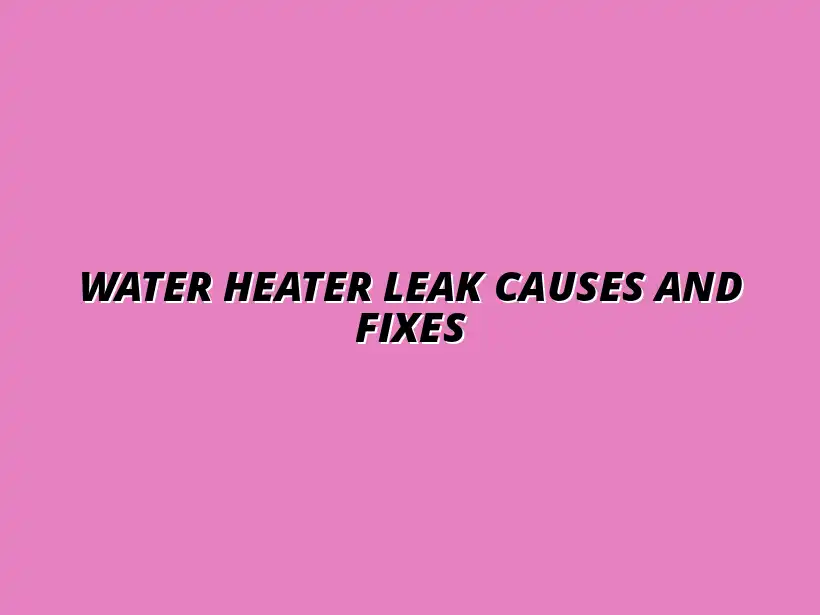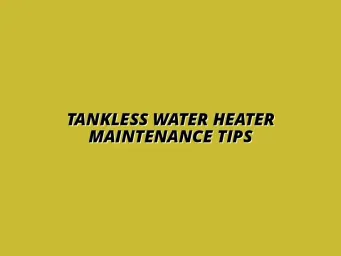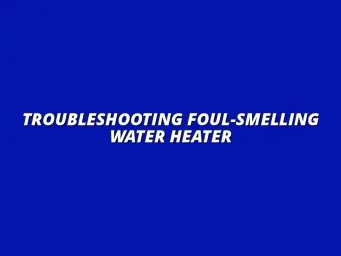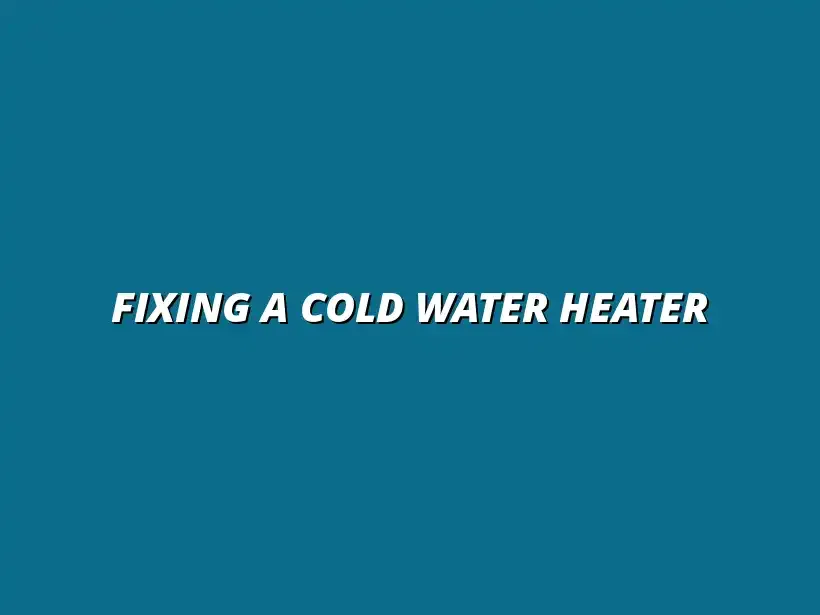
Water Heater Leak Causes and Fixes
Understanding Water Heater Leaks: Causes and Implications
Water heater leaks can be a homeowner's worst nightmare, often leading to costly damages and disruptions. When you notice water pooling around your heater, it’s crucial to act swiftly. Understanding the causes and implications of these leaks can save you money and protect your home.
Ignoring a leak might seem tempting, but it can lead to more significant issues. Not only does water damage compromise your home's structure, but it can also create a hazardous environment. Let's dive into why addressing water heater leaks promptly is essential!
The Importance of Addressing Water Heater Leaks Promptly
Addressing water heater leaks right away can prevent minor problems from escalating into major repairs. Prompt action helps maintain the integrity of your home and its value. Plus, it keeps your family safe from potential hazards like mold and electrical issues.
Another vital aspect is the potential for increased energy costs. A leaking water heater works harder to maintain temperature, leading to higher utility bills. By fixing leaks quickly, you can enhance your home's energy efficiency! For more information on maintaining your water heater efficiently, check out these water heater maintenance tips.
Impact on Home Safety and Structural Integrity
Water damage can weaken the structural integrity of your home. If left unchecked, it may lead to compromised walls, floors, or even foundations. This can pose serious safety risks for your family and guests. Learning how to detect hidden pipe leaks can be crucial in preventing larger problems.
Moreover, stagnant water is a breeding ground for mold and mildew, which can cause health issues. It’s essential to ensure your home remains a safe and healthy environment for everyone!
Preventative Measures to Avoid Major Repairs
Taking proactive steps can help avoid the hassle of major repairs down the line. Here are some preventative measures you can implement:
- Regularly inspect your water heater for signs of leaks.
- Flush the tank annually to remove sediment buildup.
- Check and replace worn or corroded fittings.
- Consider installing a water leak detection system.
By following these measures, you can extend the life of your water heater and protect your home from unnecessary damage. It's always better to be safe than sorry!
Common Causes of Water Heater Leaks
Understanding what causes water heater leaks can empower you to take action before minor issues become major problems. Here, we’ll explore some of the most common culprits.
Water heater leaks can arise from various factors, including corrosion, faulty connections, and wear due to age. Knowing these causes helps you stay vigilant and maintain your system effectively! For a comprehensive understanding of common water heater issues, refer to this helpful guide: Common Water Heater Issues Explained.
Corrosion and Rusting in Water Heater Tanks
Corrosion and rust are frequent offenders when it comes to water heater leaks. Over time, the metal tank can deteriorate due to the constant exposure to water. This process can be accelerated by factors like water quality and temperature.
Regularly checking for signs of corrosion can save you from a catastrophic leak. If you notice rust, it could be time to consider a replacement or repairs!
How Corrosion Develops Over Time
Corrosion in water heaters typically develops due to chemical reactions between metal and water. Factors that contribute to this process include:
- High acidity in the water supply.
- Low-quality materials used in the tank.
- Age of the water heater.
Once corrosion sets in, it can continuously worsen, leading to leaks. Keeping an eye on your water heater’s condition can help you catch these problems early!
Signs of Corrosion to Look For
Some signs indicate your water heater may be experiencing corrosion. Watch for:
- Rusty water coming from taps.
- Brown or red stains on the tank.
- Leaks at the base of the heater.
If you observe any of these symptoms, it’s essential to act quickly to prevent further damage and potential flooding!
Faulty Connections and Fittings
Loose or damaged plumbing connections can lead to leaks. Over time, fittings can become worn out or improperly installed, allowing water to escape. Regular maintenance is key to ensuring these connections remain secure! If you're dealing with a leaking kitchen sink, for example, this guide can help: Repairing a Leaky Kitchen Sink.
Identifying these issues early can save you from significant messes. Let’s explore how to spot them!
Identifying Loose or Damaged Plumbing Connections
To check for faulty connections, follow these steps:
- Inspect all visible connections for moisture or water stains.
- Gently tighten any loose fittings.
- Look for signs of wear, such as cracking or fraying.
These simple checks can prevent bigger problems down the road. Don’t overlook the importance of maintaining these crucial components!
Importance of Properly Installed Fittings
Properly installed fittings are vital for your water heater's performance. Incorrectly installed connections can lead to leaks and significant water damage. Ensuring professional installation can prevent headaches later!
When in doubt, consult a plumber to make sure your water heater is set up correctly. For plumbing emergencies in the Balti-Triangle/Birmingham area, consider contacting PlumbProCare. It’s always better to be cautious!
Effective Solutions for Water Heater Leaks
Dealing with a water heater leak can be stressful, but there are several effective solutions to tackle the issue. Understanding the right approach can save you time and money, especially when it comes to DIY fixes. Learning how to repair a leaking water heater pipe can be particularly helpful. In this section, I'll guide you through some handy solutions to get your water heater back in shape!
DIY Fixes for Minor Leaks
For small leaks, there are some simple fixes you can attempt on your own. It's important to act quickly to prevent any further damage to your home. Here are a couple of effective DIY solutions to consider:
- Check and tighten any loose connections, as they are often the culprit of minor leaks.
- Replace worn washers in hose fittings to help stop water from seeping out.
- For leaks from the temperature and pressure (T&P) valve, consider replacing it as a quick fix.
Step-by-Step Guide to Tightening Connections
To tighten connections effectively, follow these steps:
- Turn off the power and water supply to your water heater.
- Use a wrench to carefully tighten any loose fittings or joints.
- Inspect the area for leaks after re-establishing the water supply.
Simple tightening can often solve minor leaks and is a great first step before considering more complex repairs!
How to Replace a Faulty T&P Valve
If the T&P valve is leaking, replacing it can be a straightforward process. Here’s how to do it:
- Turn off the water supply and power to the heater.
- Drain some water from the tank to relieve pressure.
- Unscrew the old valve and replace it with a new one, ensuring a tight fit.
Replacing a faulty T&P valve can not only solve the leak but also enhance the safety of your water heater!
When to Replace Your Water Heater
Sometimes, a leak indicates a more significant issue that might require you to replace your water heater entirely. Knowing when to take this step can save you a lot of hassle down the road. Here are some signs that indicate it's time for a replacement:
- Frequent leaks or repairs that keep returning.
- Aging unit — most heaters last about 10-15 years.
- Rusty water or visible corrosion on your tank.
Signs Indicating a Full Replacement is Necessary
Besides the signs mentioned, look out for:
- Unusual noises such as banging or popping sounds.
- Inconsistent water temperatures.
- Increased utility bills, signaling inefficiency.
If you notice any of these signs, it might be time to consider a new water heater!
Choosing the Right Replacement Water Heater
When it's time for a replacement, consider the following factors:
- Type: Decide between tankless, electric, or gas water heaters based on your needs.
- Size: Ensure the capacity matches your household requirements.
- Energy efficiency: Look for models with higher efficiency ratings to save on bills.
Choosing the right model can lead to a more efficient and hassle-free experience! For dealing with a leaky bathroom faucet, a simple DIY fix might be all you need. Check out this helpful guide: Fix Your Leaky Bathroom Faucet.
Preventative Maintenance Tips for Longevity
Preventative maintenance is key to ensuring your water heater functions well for years. Regular check-ups can help you avoid leaks and costly repairs. Here are some tips to keep your water heater in top shape:
- Flush the tank annually to remove sediment buildup.
- Check the anode rod every few years and replace it if it's corroded.
- Inspect valves and connections regularly for any signs of leaks.
Regular Maintenance Routines to Prevent Leaks
Consider establishing a regular maintenance schedule, which can include:
- Monthly visual inspections for leaks or rust.
- Yearly flushing of the tank.
- Professional inspections every few years for comprehensive care.
By being proactive, you can extend the lifespan of your water heater and keep your home safe!
Investing in Water Heater Inspections
Investing in a professional inspection can pay off significantly. A technician can:
- Identify potential issues before they become major problems.
- Provide advice on maintenance and repairs.
- Ensure that your system runs safely and efficiently.
Regular inspections can give you peace of mind and prevent unexpected leaks!
Frequently Asked Questions About Water Heater Leaks
Many homeowners have questions regarding water heater leaks. Here are some of the most frequently asked ones:
What should I do if I notice water pooling around my water heater?
If you see water pooling, immediately turn off the water supply and the heater. Check for visible leaks, and if you're unsure, contact a professional to assess the situation.
Can a leaking water heater cause damage to my home?
Yes, a leaking water heater can lead to significant damage, including mold growth and structural issues. It's essential to address leaks quickly to minimize any potential harm!
Final Thoughts on Water Heater Maintenance and Leak Prevention
Understanding how to manage water heater leaks is crucial for maintaining a safe and efficient home. By recognizing the causes and implementing effective solutions, you can enjoy a worry-free experience with your water heater!
Recap of Key Points on Managing Water Heater Leaks
To summarize, here are the main points to remember:
- Address leaks promptly to prevent further damage.
- Know when to tackle minor repairs or when to replace your unit.
- Regular maintenance can significantly prolong the lifespan of your water heater.
Summarizing Causes and Solutions
Remember the common causes of leaks, such as faulty connections or sediment buildup, and how to address them. Having a plan for both DIY fixes and professional help can make a big difference!
The Importance of Regular Maintenance
Regular maintenance is essential for preventing leaks and ensuring your water heater operates effectively. Investing time in upkeep can save you from costly repairs later on!
Encouragement to Take Action on Water Heater Issues
If you're facing any water heater issues, don’t hesitate to take action! Address minor leaks yourself, but be ready to call in a professional for more serious problems.
Next Steps for Homeowners Facing Water Heater Problems
Start by conducting a thorough inspection and consider setting up a maintenance routine. If you’re unsure about repairs, reaching out to an expert can help guide you in the right direction!
Connecting with Professionals for Comprehensive Solutions
In the end, connecting with professionals ensures that any issues are addressed properly and safely. Don’t wait until it’s too late — stay proactive about your water heater maintenance!




